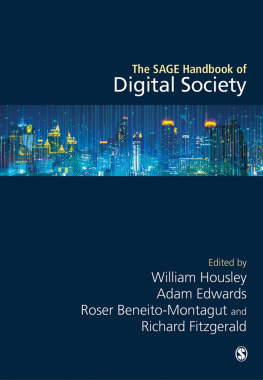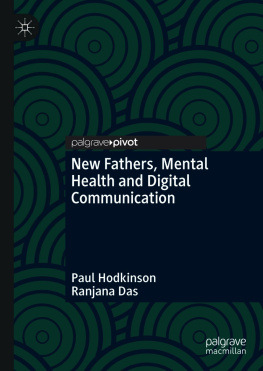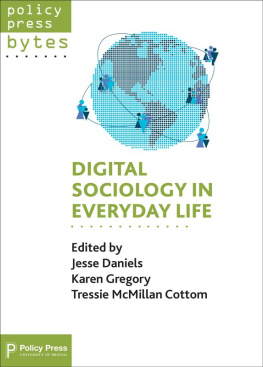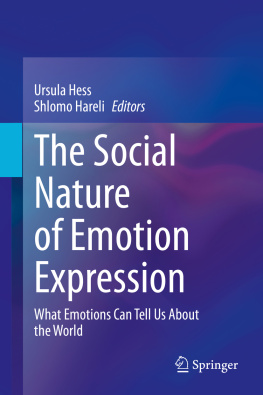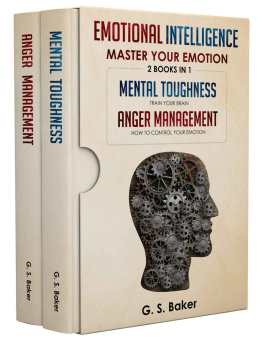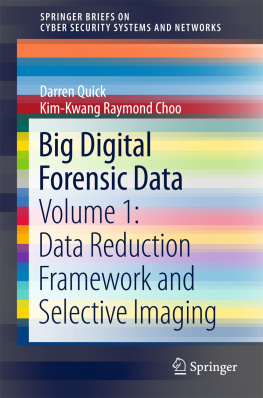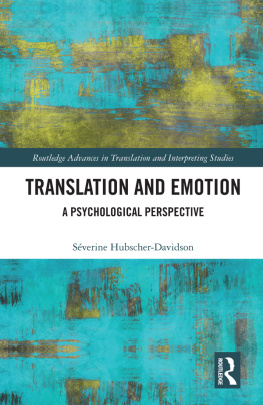
In this book, the authors delve deep into the affective vibrancies and forces of digital life. As they show, feelings are the foundation of many online interactions and content. Feelings are aroused with and through the internet and compel us to want to stay engaged online - to upload, like, comment, share and post photos, videos, emojis, GIFs and memes. This book provides important insights into these processes.
Prof. Deborah Lupton, author of Data Selves: More-than-Human Perspectives (Polity) and Digital Food Cultures (Routledge)
From affective atmospheres to woebots, from artificial intelligence to the emojification of the everyday, Darren Ellis and Ian Tucker pursue how bodies, collective and individual, are continually shifting in conjunction with technological and digital processes. Always empirically situated, Ellis and Tuckers nuanced psycho-social approach to affect and emotion reveals possibilities for critical intervention into our contemporary moment, while simultaneously opening pathways for future-oriented analyses to undertake.
Prof. Gregory J. Seigworth, co-editor of The Affect Theory Reader (Duke University Press, 2010) and co-editor of Capacious: Journal for Emerging Affect Inquiry
Emotion in the Digital Age
Emotion in the Digital Age examines how emotion is understood, researched and experienced in relation to practices of digitisation and datafication said to constitute a digital age . The overarching concern of the book is with how emotion operates in, through, and with digital technologies. The digital landscape is vast, and as such, the authors focus on four key areas of digital practice: artificial intelligence, social media, mental health, and surveillance. Interrogating each area shows how emotion is commodified, symbolised, shared, and experienced, and as such, operates in multiple dimensions. This includes tracing the emotional impact of early mass media (e.g. cinema) through to efforts to programme AI agents with skills in emotional communication (e.g. mental health chatbots). This timely study offers theoretical, empirical and practical insight regarding the ways that digitisation is changing knowledge and experience of emotion and affective life. Crucially, this involves both the multiple versions of digital technologies designed to engage with emotion (e.g. emotional-AI ) through to the broader emotional impact of living in digitally saturated environments. The authors argue that this constitutes a psycho-social way of being in which digital technologies and emotion operate as key dimensions of the ways we simultaneously relate to ourselves as individual subjects and to others as part of collectives. As such, Emotion in the Digital Age will prove important reading for students and researchers in emotion studies, psychology, science and technology studies, sociology, and related fields.
Darren Ellis is Senior Lecturer in the Department of Social Sciences at the University of East London, UK, and co-author of Social Psychology of Emotion .
Ian Tucker is Professor in the School of Psychology at the University of East London, UK, and co-author of Social Psychology of Emotion .
Routledge Studies in Science, Technology and Society
36 Scientific Imperialism
Another Facet of Interdisciplinarity
Edited by Uskali Mki, Adrian Walsh and Manuela Fernndez Pinto
37 Future Courses of Human Societies
Critical Reflections from the Natural and Social Sciences
Edited by Klber Ghimire
38 Science, Africa and Europe
Processing Information and Creating Knowledge
Edited by Patrick Harries, Martin Lengwiler and Nigel Penn
39 The Sociology of Structural Disaster
Beyond Fukushima
Miwao Matsumoto
40 The Cultural Authority of Science
Comparing across Europe, Asia, Africa and the Americas
Edited by Bauer, MW, Pansegrau, P and Shukla, R
41 Blockchain and Web 3.0
Social, Economic, and Technological Challenges
Edited by Massimo Ragnedda and Giuseppe Destefanis
42 Understanding Digital Events
Bergson, Whitehead, and the Experience of the Digital
Edited by David Kreps
43 Big DataA New Medium?
Edited by Natasha Lushetich
For the full list of books in the series: https://www.routledge.com/Routledge-Studies-in-Science-Technology-and-Society/book-series/SE0054
Emotion in the Digital Age
Technologies, Data and Psychosocial Life
Darren Ellis andIan Tucker
First published 2021
by Routledge
2 Park Square, Milton Park, Abingdon, Oxon OX14 4RN
and by Routledge
52 Vanderbilt Avenue, New York, NY 10017
Routledge is an imprint of the Taylor & Francis Group, an informa business
2021 Darren Ellis and Ian Tucker
The right of Darren Ellis and Ian Tucker to be identified as authors of this work has been asserted by him/her/them in accordance with sections 77 and 78 of the Copyright, Designs and Patents Act 1988.
All rights reserved. No part of this book may be reprinted or reproduced or utilised in any form or by any electronic, mechanical, or other means, now known or hereafter invented, including photocopying and recording, or in any information storage or retrieval system, without permission in writing from the publishers.
Trademark notice : Product or corporate names may be trademarks or registered trademarks, and are used only for identification and explanation without intent to infringe.
British Library Cataloguing-in-Publication Data
A catalogue record for this book is available from the British Library
Library of Congress Cataloging-in-Publication Data
A catalog record has been requested for this book
ISBN: 9781138091030 (hbk)
ISBN: 9781315108322 (ebk)
Typeset in Times New Roman
by Deanta Global Publishing Services, Chennai, India
In memory of David Tucker. Ian X
Contents
This book follows from our previous Social Psychology of Emotion (2015) book, which finished with a realisation of the growing influence of digital and data practices on our emotional and affective lives. We would like to thank Routledge for including this book in their Studies in Science, Technology and Society Series (particular thanks to Neil Jordan and Alice Salt).
We would like to acknowledge the funding provided to support research discussed in the book, including the Social Media and Austerity projects funded by EPSRC Communities and Culture Network and discussed in Chapter Five. The University of East London (UEL) also partly funded the empirical work on a project entitled Experiences of Social Media in Chapter Four. Additionally, the work in Chapter Six was supported by UEL School of Psychology funding.
The ideas developed in this book have emerged through many hugely valuable conversations and discussions with colleagues and friends. We would like to thank them all, as they have been invaluable to the completion of this book. In particular, we would like to thank Steve Brown, John Cromby, Lewis Goodings, Dave Harper, Ava Kanyeredzi, Anna Lavis, Laura McGrath, Paula Reavey, Tony Sampson, Buadaplup Snchez-Escribano, Paul Stenner, and Angie Voela. We owe you all a drink (or two).
Last, but not least, we thank our families: Nicola, Katherine, Noah, Lily, Isaac, Otto, and Arthur.


